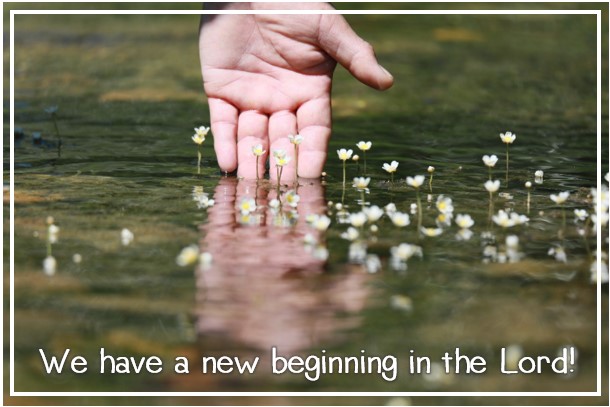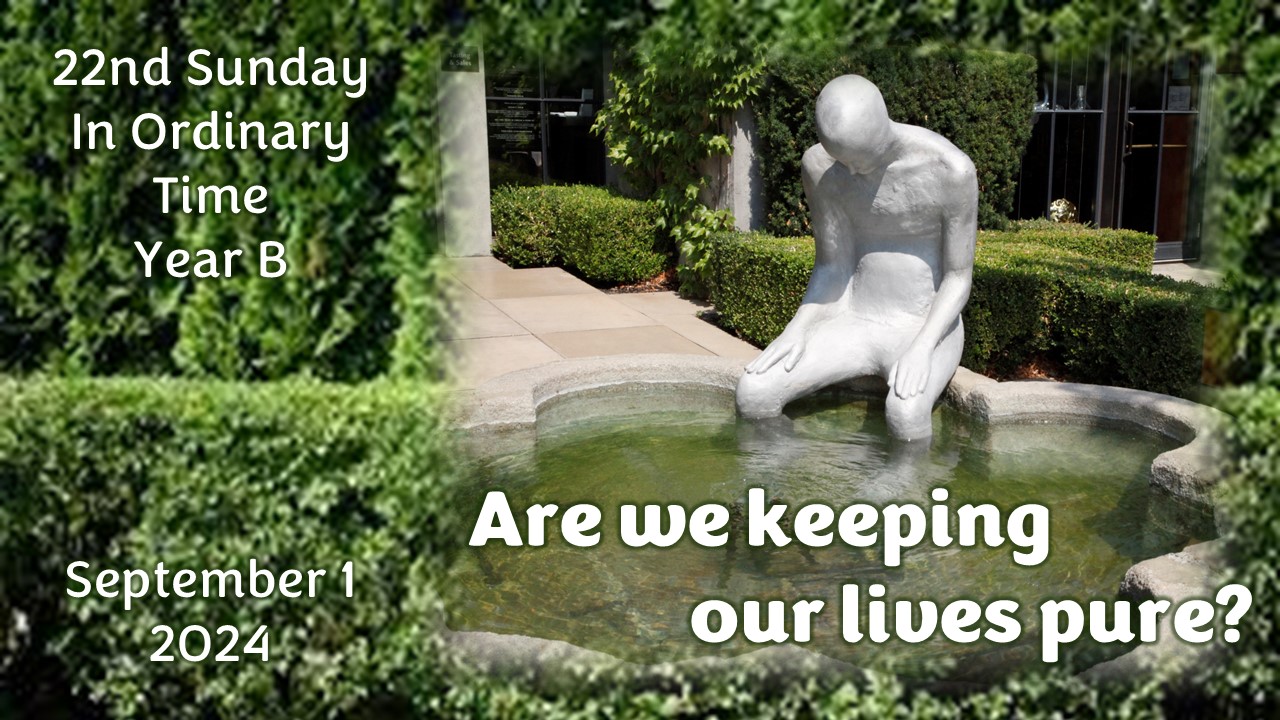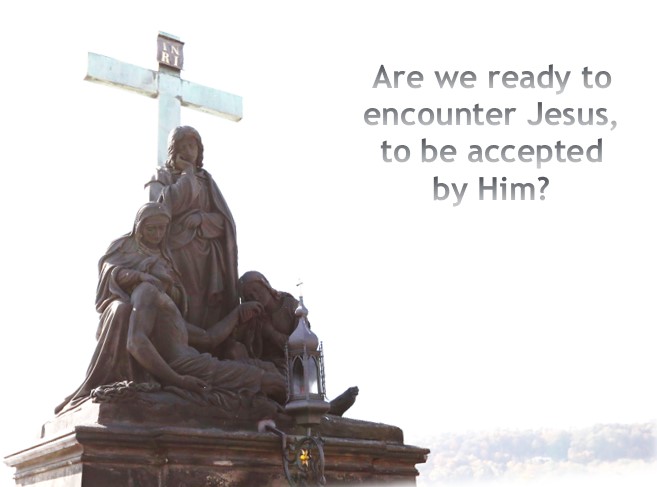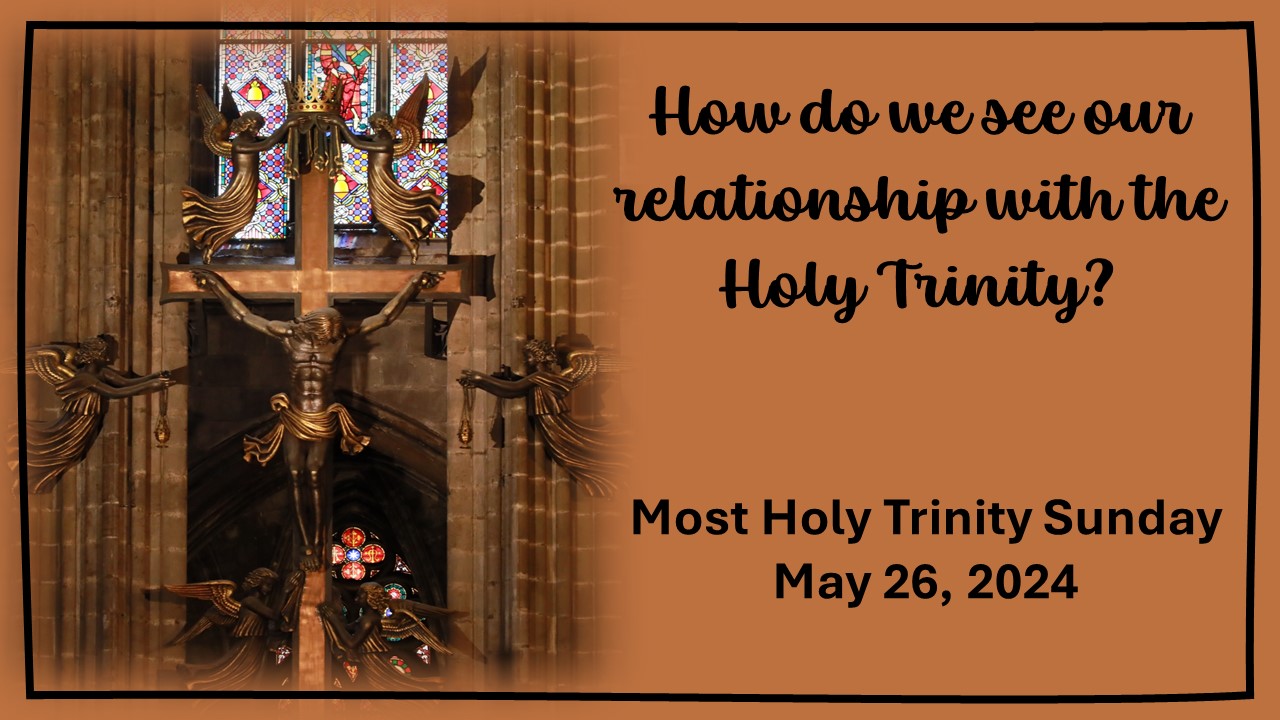
5th Sunday of Lent Year A ~ March 26, 2023
We share in his Death & Resurrection
Once upon a time there was a woman who had been lost in the desert for three whole days without water. Just as she was about to collapse, she saw what appeared to be a lake just a few hundred yards in front of her. “Could it be? Or is it just a mirage?” she thought to herself. With the last bit of strength, she could muster, she staggered toward the lake and quickly learned that her prayers had been answered: it was no mirage—it was indeed a large, spring-fed lake full of fresh water—more fresh water than she could ever drink in her lifetime. Yet while she was literally dying of thirst, she couldn’t bring herself to drink the water. She simply stood by the water’s edge and stared down at it.
There was a passerby riding on a camel from a nearby desert town who was watching the woman’s bizarre behavior. He got off his camel, walked up to the thirsty woman and asked, “Why don’t you have a drink, ma’am?” She looked up at the man with an exhausted, distraught expression across her face and tears welling up in her eyes. “I am dying of thirst,” she said, “But there is way too much water here in this lake to drink. No matter what I do, I can’t possibly finish it all.”
The passerby smiled, bent down, scooped some water up with his hands, lifted it to the woman’s mouth and said, “Ma’am, your opportunity right now, and as you move forward throughout the rest of your life, is to understand that you don’t have to drink the whole lake to quench your thirst. You can simply take one sip. Just one small sip… and then another if you choose. Focus only on the mouthful in front of you, and all your anxiety, fear and overwhelm about the rest will gradually fade.”
As we continue our Lenten journey by praying, fasting and almsgiving, Sacred Scripture keeps inviting us to meditate on the love and mercy of God. In the Book of the Song of Songs, it is written “Death is as strong as love is” which means no one can deny the reality of death. Through the Sacred Scripture we are reminded that our life is too short, and we must remember that we are dust and unto dust shall we return. Our life is being compared with the flowers of the grass which grows in the morning and withers in the evening. Most of the time, like the woman in the story above, we find it hard to grasp everything about the mystery of life and death. We are created in the image of God and he himself has created us wonderfully in our mother’s womb (Please read Psalm 139). We all have gone through the experience of loosing someone from our families which lead us to hurt and pain. Sometimes that hurt and pain leads us to doubt our faith and we loose trust in the Lord. However, in the Book of Revelation, the Lord invites us to remember “He has set his tent among and will wipe away tears from our eyes” (21:1-5). And also the Lord consoles us by saying “Come to me all that are weary and carrying heavy burdens….(Matthew 11:27-30).
For the last three Sundays we have been reading from the Gospel of St. John which has the beauty of opening our minds to understand the true meaning of those miracles done by the Lord. On the third Sunday we all reflected on the dialogue of Jesus with the Samaritan woman which ended up with the conversion of the woman which led her to become a missionary to witness his name to her people in the town. And on the fourth Sunday we focus our eyes on the healing of a born blind man whom the Lord healed, and his healing led to a controversary among the Jewish because he was cured on the Sabbath Day. No one appreciated the Lord but came to attack the Lord and the blind man. However, once the blind man was driven out, the Lord found him. Now here comes the true meaning of gain sight “Lord I believe in you”. I believe in death though physically we are lost but spiritually we are found in the Lord “if we die in him, we will also rise with him” as St. Paul says. Through death we share the company of the saints and see the Lord as he really is.
Faced with death, life might seem absurd and meaningless. But our Christian faith tells us that despite death, life is not absurd and meaningless. Life for each of us took on a completely different meaning when our parents decided to have us baptized into the Catholic Church. When we were baptized, we became adopted sons and daughters of God. When we were baptized, this planet was no longer our home, and then heaven became our true homeland. When we were baptized, we were no longer on our own. When we were baptized, we were joined with Jesus in leaving behind an old life and beginning a new life. When Jesus died, he left his old life behind him. He rose from the dead, having left behind life in a human body like ours. When we were baptized, we joined Jesus in his dying, leaving behind our old self, and we joined Jesus in his resurrection, becoming new persons (Please read Romans 6). When we were baptized in Christ Jesus we were baptized in his death. In other words, when we were baptized, we went into the tomb with him and joined him in death, so that as Christ was raised from the dead by the Father’s glory, we too might live a new life. In every Mass we remember that we share in Jesus’ death and resurrection, for example “We proclaim your Death, O Lord, and profess your Resurrection until you come again.” “When we eat this bread and drink this Cup, we proclaim your Death, O Lord, until you come again.” The whole chapter of 1 Corinthians 15 speaks about the resurrection of the dead and makes us to believe that Jesus is the author of eternal life “I came to give life and life in abundance” as St. John proclaims in his Gospel. Our understanding of death is different than of other people of faith (Please read Wisdom 3:1-9) because we believe that God has created everything for eternity (Wisdom 1:12-14 & Ezekiel 18:28-32). St. Paul says that our homeland is in heaven (Phil 3:20). We build houses for ourselves. We decorate them. We become settled in life. Very few people like moving around from one place to another. And yet even though we are so settled where we are, we might think we are at home here, but if we have faith we can see beyond the surface of life and we know that we have been created to know, love and serve God.
In the First Reading we see how God is trying to revive the dead by saying “I am going to open your graves, and bring you up from your graves, O my people; and I will bring you back to the land of Israel”. Here we must remember that God is not speaking about physical death of Israelites but death of faith, conscious and morality. They just became like people who don’t listen and neither act. God has been experiencing disobedience from the Israelites, but he kept forgiving them as the Responsorial Psalm is reminding us “if you, O Lord, should mark iniquities, Lord, who could stand? But there is forgiveness with you, so that you may be revered”. God wants to have life so that we could hear him and obey his commandments because “God loved the world so much that he gave us his only Begotten Son that we may not be condemned but may have eternal life” as St. John says.
The Gospel of this fifth Sunday of Lent is that of the resurrection of Lazarus. This Gospel once again opens a great conversation of the Lord with Martha. However, before the death of the Lazarus, the Lord receives the message that “to whom he loves, is sick” and response of the Lord is eye opener for us “his sickness is to show the glory of God”. Do we see the joy and glory of God in our sickness Recently we have attended four sessions of “Horizons of Hope” which really help us to see the joy in our life and death and always to cherish the beautiful gift of life which the Lord has given us. However sometimes we become like the following story:
A penguin was standing on the water’s edge when he looked up at an eagle soaring high above his head.
He watched him with great admiration for a few moments and then looked down at his own flippers with frustration.
The penguin shuffled up to the tallest rock on the beach and flapped his wings vigorously.
“That looks so cool, I wish I could fly in the air like an eagle,” he thought to himself before accepting reality, sliding into the sea, and swimming away.
The eagle looked down and saw the penguin swimming gracefully in the water.
He watched him with similar admiration for a few moments and looked across at his own wings, wondering if they would work under water.
“That looks so cool, I wish I could fly in the water like a penguin,” he thought to himself, before accepting reality, catching another updraft, and effortlessly soaring away into the distance.
Every now and then, I look at the talents and capabilities of others and wish that I was like them.
And my suspicion is that many of those I admire have others in their lives whom they envy.
And so, it goes on, the endless loop of comparison and inevitable disappointment.
A penguin is a penguin for a reason, and it is remarkably good at what it was created for.
An eagle is an eagle for a reason, and it is remarkably good at what it was created for.
And you are you for a reason and have the capacity to become remarkably good at what you were created for.
The sooner we accept this, the happier and more successful we will be!
Let us continue to explore the Gospel Reading today. We all know through the Gospels that Lazarus was the brother of Martha and Mary; they were very close to Jesus. There are only two places in the Gospels where Jesus literally have wept (Please read for the second time Jesus wept Luke 20). When He arrived in Bethany, Lazarus had already been dead for four days; Martha runs to meet the Master and says to Him, “If you had been here, my brother would not have died!”. Jesus answers her: “Your brother will rise again”; and adds: “I am the resurrection and the life; those who believe in me, even if they die, will live”. Jesus shows himself as the Lord of life, the One who can give life to the dead too. Then Mary and others arrive, all in tears, and Jesus, the Gospel says, “was deeply moved and troubled and wept”. With this turmoil in His heart, He goes to the grave, thanks the Father who always listens to Him, opens the tomb, and shouts loudly: “Lazarus, come out!” (v. 43). And Lazarus comes out with “his feet and hands wrapped with burial bands, and his face wrapped in a cloth” (Please read Sirach 38:16-32).
Here we touch with our hands that God is life and gives life, but he takes charge of the tragedy of death. Jesus could have prevented the death of his friend Lazarus, but he wanted to share in our pain for the death of loved ones, and above all he wanted to show God’s dominion over death.
Holy Father Pope Francis says “In this passage of the Gospel we see that the faith of man and the omnipotence of God, of God’s love seek each other and finally meet. It is like a double path: the faith of man and the omnipotence of God’s love that one seeks and eventually meets. We see it in the cry of Martha and Mary and of all of us with them: “If you had been here!” And God’s answer is not a speech, no, God’s answer to the problem of death is Jesus: “I am the resurrection and life… Have faith! During grief, we continue to have faith, even if death seems to have won. Remove the stone from your heart! Let the Word of God restore life where there is death. Even today Jesus repeats to us: “Take away the stone.” God did not create us for the tomb, he created us for life, beautiful, good, joyful. But “death has entered the world through the devil’s envy”(Wis 2:24), says the Book of Wisdom, and Jesus Christ has come to free us from its bonds”.
The resurrection of Lazarus is also a sign of the regeneration that takes place in the believer through Baptism, with the full integration into the Pascal Mystery of Christ. For the action and power of the Holy Spirit, the Christian is a person who journeys in life as a new creature: a creature for life and who goes towards life.
There was an old man who was sharing his own story about grief and despair. He was talking about how he is still alive despite losing his loved ones and other people he knew. He couldn’t keep count of those who he had lost from years ago, his father, mother, sister, friends, best friend, co-workers, relatives, teachers, students, neighbors, and other acquaintances. The old man had no children and couldn’t imagine the pain of losing a child, but he continued to share his two cents about death. Despite experiencing and witnessing death around him, he could never get used to people dying. Not that he can’t but he doesn’t want to.
Every death tears a hole through his heart and no matter what the circumstance is, he doesn’t want the death of the people he cared about to not matter. The scars he had are proof of the love and relationship he had with the person who died. The deeper the scar is, the deeper the love he has for that person. The old man continued about how grief comes in waves. When in a shipwreck, you will drown at first with all the wreckage around you. The debris floating around will remind you of the beauty the ship once possessed. For a while, you hang on it to float and stay alive which could be the happy memories you had with the person that died. At first, the waves will be around 100 feet tall and will crash over you endlessly. They will come 10 seconds apart and won’t give you enough time to catch your breath. All you can do is hang on for dear life and float.
It will take maybe weeks or months before the moment the waves start to calm. It may still reach 100 feet tall, but the waves will now come further apart. You are afraid that the wave may crash and wipe you out but this time, you can gasp for more air and function more. You may never know what could suddenly trigger your misery. Who knows? It could be a distant memory from a song, a picture, an intersection from across the street, the smell of coffee, the night breeze, and more other things! Anything could remind you of someone you love deeply and once lost – and again the waves keep crashing your body if this happened. However, this time, in between waves, there is life. Eventually, you will find the once tall and scary waves to be only 80, 50, or 30 feet tall. While they still come from time to time, they will continue to come further apart. You can now anticipate it when it’s coming like an anniversary, Christmas, birthday, or seeing their room.
You will be surprised to know that when it is coming, you are more prepared for it for the most part. And when the fear of the waves washes over you, you will somehow know that you will come out the other side again. Although you are soaking wet and holding on to some tiny piece of wreckage, you will continue to breathe and come out. “Take it from me.” said the old guy. “The waves will never stop coming but you will learn how to survive it as times went on.”?
Let us ask the Lord to strengthen us always with his love and mercy so that we may believe that death is not the end but beginning of our new life in the Lord. Let us pray for those who have gone before us to the Lord, that the Good Lord may grant eternal rest unto them and peace and consolation to their grieving families.
Other Sermons In This Series

22nd SUNDAY IN ORDINARY TIME YEAR B ~ SEPTEMBER 1, 2024
August 29, 2024

31st Sunday in Ordinary Time Year C ~ October 30, 2022
October 28, 2022

Solemnity of Holy Trinity Year B ~ MAY 26, 2024
May 23, 2024

